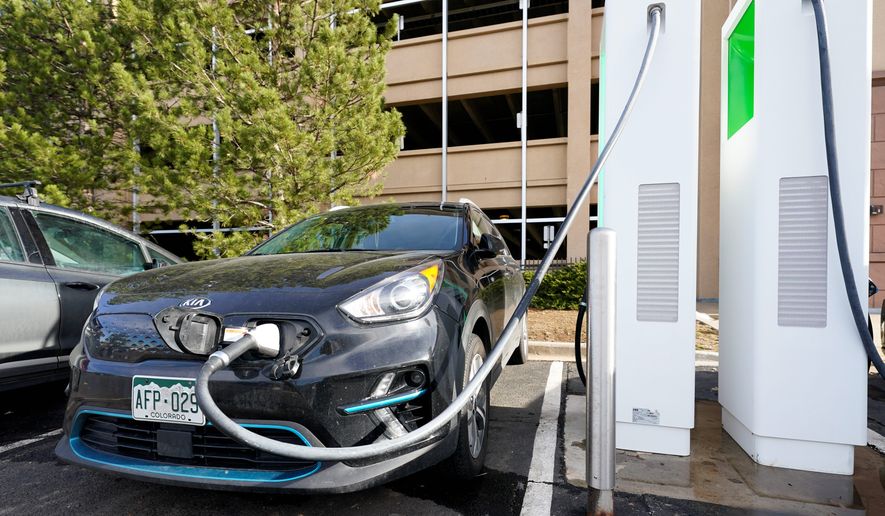President Biden’s push to fill the nation’s roads with electric vehicles would be a boon for China and would increase America’s dependence on the communist power, which dominates the globe in advanced battery production and the mining of rare minerals needed to make those batteries.
The White House is working with congressional Democrats to ensure its infrastructure package includes at least $174 billion for “made in America” electric vehicles. At least $40 billion would be used to install 500,000 electric vehicle charging stations across the country.
“I’m proposing a plan for the nation that … will grow the economy, make us more competitive around the world, promote our national security interests and put us in a position to win the global competition with China in the upcoming years,” Mr. Biden said recently.
But instead of putting the communist superpower on notice, the administration’s embrace of electric vehicles would benefit China, experts say.
“At the moment, Beijing leads every other country in the production of electric vehicle batteries,” said Dan Kish, a senior fellow at the Institute for Energy Research. “They control the resources and the technology that U.S. automakers will need to import in abundance to make electric cars a viable alternative” to gas-powered engines.
China produced 72% of the world’s lithium-ion rechargeable batteries in 2019, and the U.S. accounted for 9%. The batteries are used most frequently to power electric vehicles, according to the Energy Department.
The Chinese regime’s dominance is the result of long-range investment and planning.
Beijing is on track to develop at least 107 lithium-ion battery megafactories by 2030. At least 53 are already up and running. Meanwhile, the U.S. is expected to develop nine megafactories, three of which are now operational.
If those trends continue, then most of the electric vehicles built in the U.S. will rely on key components imported from China.
Mr. Kish, who served as an energy and environmental policy adviser to Paul D. Ryan when he was House speaker, told The Washington Times that President Biden was “jumping the gun on electric vehicles before having the capacity necessary to build and sustain them” without China’s resources.
More troubling is that China is producing most of the rare earth minerals and chemicals required for electric vehicle batteries.
“There is not enough lithium being produced in the U.S. to support new electric vehicle battery manufacturing,” said USA Rare Earth CEO Pini Althaus. “Outside of the non-China supply chain, there are not enough materials now for one electric vehicle manufacturer, let alone all of the electric vehicle manufacturers in the world.”
Mr. Althaus’ company is working to bolster the domestic supply of minerals critically needed for electric vehicles and other green energy projects. It is finding success but still faces an uphill battle.
China produced 80% of the raw materials used for advanced batteries, a 2019 report by the London-based Benchmark Mineral Intelligence found. Lithium, as well as cobalt, nickel and graphite, are all critical for producing electric vehicles.
China is estimated to control 80% to 90% of the global rare earth minerals market. The U.S. imports about 80% of its rare earth minerals and compounds from the communist power.
China demonstrated its dominance in the sector in 2018 when it produced 60% of all-electric vehicles sold worldwide.
Part of the reason for China’s supremacy in the electric vehicle market is that the U.S. is not taking full advantage of its chemical resources.
The nation has a significant number of resources required to build lithium-ion batteries, including cathodes and anodes.
The three cathode extraction plants in the U.S. produce just 1% of the chemical globally. China, on the other hand, produces more than 65% of all cathodes and 82% of all anodes.
The U.S. is at a significant risk of becoming even more dependent on China if the Biden administration’s push toward electric vehicles is successful.
“With gas-powered cars, at least there are options from where you can get the petroleum that is eventually refined into gasoline,” Mr. Kish said. “It can come from the Middle East, Canada or even the Gulf Coast. With electric cars, you don’t have that flexibility.”
That reality is something the Trump administration attempted to address. During his first year in office, President Trump issued an executive order establishing a federal strategy on securing sufficient critical mineral supplies outside of China.
Mr. Trump expanded that effort after the COVID-19 pandemic exposed the frailty of U.S. supply chains. In mid-2020, he issued an executive order declaring that America’s reliance on China for rare earth minerals posed a national emergency.
“Our over-reliance on countries like China that are not reliable trading partners for critical supply chains threatens our economic and national security,” Dan Brouillette, energy secretary in the Trump administration, wrote in an op-ed at that time.
Mr. Biden has followed the Trump administration’s lead.
On his first day in the White House, Mr. Biden issued his own executive order to bolster the domestic stockpile of critical minerals. The administration also is proposing that its upcoming infrastructure package include money for research and development in mining.
“America is in a race against economic competitors like China to own the [electrical vehicle] market, and the supply chains for critical materials like lithium and cobalt will determine whether we win or lose,” Energy Secretary Jennifer M. Granholm said recently.
Mr. Althaus told The Washington Times that the Biden administration is off to a “good start” but it will take significantly more time and resources to end the U.S. reliance on China for electric vehicle batteries and rare earth minerals.
• Haris Alic can be reached at halic@washingtontimes.com.




Please read our comment policy before commenting.